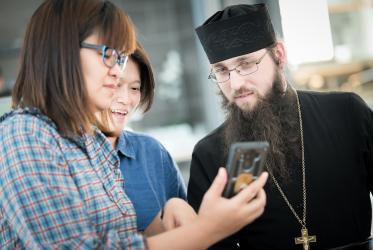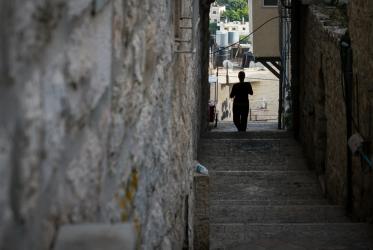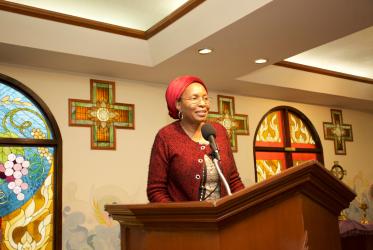I recently attended the conference on ‘Interreligious dialogue for peace: Promoting Peaceful coexistence and common citizenship’ organized by KAICIID in Vienna on the 26 and 27 of February. The conference brought together some high profile religious leaders (predominantly but not exclusively from the Christian and Muslim faiths) who spoke with a united voice for social cohesion, peaceful coexistence and respect for religious diversity.
What evidently permeated the conference was the conviction that in the present context of the furious mixing of religion and violence if religions were not part of the solution we continue being part of the problem. I am usually skeptic about high profile dialogue whose primary investment is predominantly symbolic, and is predicated on tricky ‘trickledown’ theories. However, there were aspects of this conference which ‘warmed’ my heart – in the below freezing temperatures of Vienna as it withstood the onslaught by the ‘beast from the East’.
One warming feature was the reiteration of the importance of partnership at various levels. As co-pilgrims on the long path to peace we drew strength from the African proverb, “If you want to go fast, go alone. If you want to go far, go together.”
Sharing a positive story of the value of partnerships Sultan Alhaji Muhammad Sa’ad Abubakar III, the 20th Sultan of Sokoto spoke of how in Nigeria Christians and Muslims have moved beyond interfaith dialogue to cooperation, fighting a common enemy - anopheles gambiae -- the malaria-carrying mosquito. “Mosquitoes do not know religion. They go to the mosques on Fridays and Churches on Sundays to bite people, regardless of their religion. We decided we must unite to fight our common enemy,” he said.
Discussions on peace in Vienna also warmed my heart more than usual because they were grounded in the deeper questions of cohesion, coexistence and common citizenship. Approaching peace through the lens of discrimination and disenfranchisement is important if interfaith cooperation assumes a preventive as well as restorative dimension. It helps locate religiously motivated violence within the matrices of exploitative economics and opportunistic politics and develop an integrated approach to peace.
Another source of warmth was the focus on interreligious education and especially the training of young people. Investment in training and education is a long-term means of dispelling prejudice and preventing conflicts. That's important because the cardinal sin of interreligious work has been ‘hit and run’ engagement.
A popular saying which has echoed through history in the WCC is that “interfaith engagement is not an emergency room service, it is not a quick fix; rather it is a public health programme where through prophylactic medicine and vaccines a whole culture of tolerance and resistance to violence is built up.”
Interfaith education, which is prepared for the ‘long haul’, rescues interreligious engagement from being just a short term emergency response. Of course there are times where religious actors have to be quick on their feet but interfaith engagement must go beyond coming together to put out fires. Prevention, reconciliation and restoration require resilience and perseverance.
Reflecting further on this conference makes me think of the parable of the sower told by Jesus:
A sower went out to sow. And as he sowed, some seeds fell on the path, and the birds came and ate them up. Other seeds fell on rocky ground, where they did not have much soil, and they sprang up quickly, since they had no depth of soil. But when the sun rose, they were scorched; and since they had no root, they withered away. Other seeds fell among thorns, and the thorns grew up and choked them. Other seeds fell on good soil and brought forth grain, some a hundredfold, some sixty, some thirty. (Matthew 13:3-8)
There are two points that I draw from the parable.
First, responsibility: The only instance where the seed flourishes and bears fruit is in good soil. Those familiar with farming know that ‘good soil’ does not just happen. Good soil is the result of ploughing and preparing – a result of concerted effort. If the seeds of peace are to bear concrete fruits, we need to commit to prepare the soil and nurture the seeds to fruition. The question to all ‘actors’ is whether we are willing to prepare the good soil - knowing fully well that this often means getting our hands dirty?
Second, ‘response-ability’: This is a parable concerning receptivity and response. Matthew’s gospel implies that this parable is addressed to those whose heart has grown dull, those who have wilfully shut their ears and eyes, and refuse to ‘understand with their heart and turn’ (verse 15). We often tend to see ‘such people’ on the ‘other’ side of the table and not among us. However, the seeds of peace will bear fruit only if religious communities are self-critical. We need to look back at how, predicated by political and economic expediencies, we ourselves have often wilfully shut our ears and eyes to violence that does not affect ‘us’. We need to repent for the wilful and selective silence which shrouds our complicity. Are we ready to cultivate a response-ability which doesn’t wilfully shut the eyes and ears of our conscience and ‘understands with the heart’ and repents?
In many ways this conference was an important signpost for religions to move forward towards a more hopeful future; especially in a muddied and muddled global political context where it seems – to use the words of the Christian theologian Sathianathan Clarke - “The gods have returned, but it is with a vengeance. Some of their most devout agents are turning fear of God into terror for the world.”[1] Responsibility and response-ability may just be the first steps along the long path towards a culture of peace.
[1] Sathianathan Clarke, Competing Fundamentalisms: Violent Extremism in Christianity, Islam, and Hinduism, (Kentucky: Westminster John Knox, 2017)





